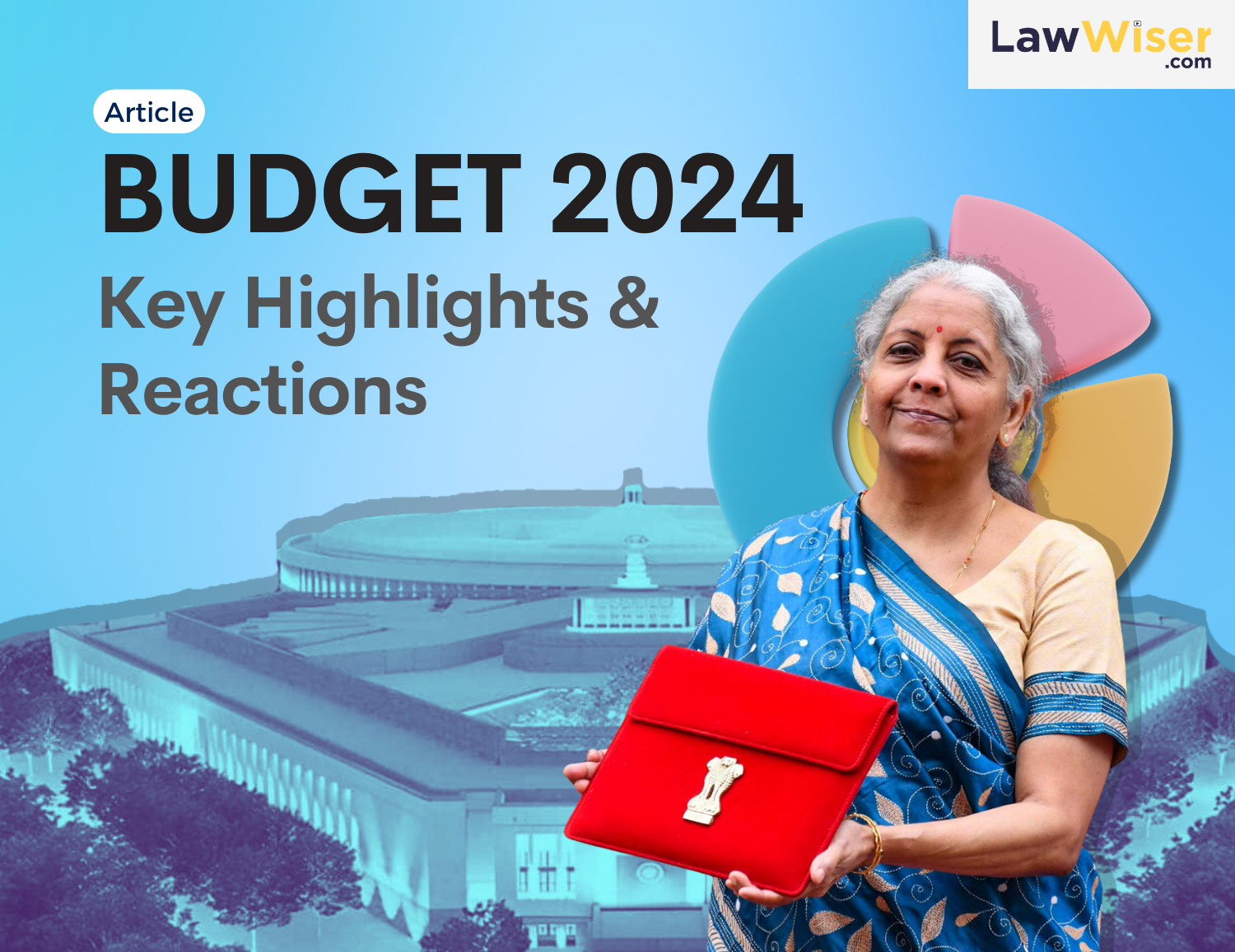After much anticipation and speculation, the Modi government’s third consecutive term has unveiled its first budget. Finance Minister Nirmala Sitharaman presented the Union Budget 2024-25 on July 23, setting a strategic direction for India’s economic development.
The budget places a strong emphasis on supporting the poor, women, youth, and farmers, underscoring the government’s dedication to inclusive growth. Key highlights include increased spending, job creation initiatives, and substantial tax relief for the middle class. Significant tax changes involve an increase in the Securities Transaction Tax (STT), reductions in both short-term and long-term capital gains taxes, and the removal of the angel tax. Moreover, revisions to the personal income tax slabs in the New Tax Regime provide more flexibility and relief for taxpayers.
The budget also focuses on the agricultural sector, with measures to enhance productivity and sustainability. It introduces new employment schemes, financial support for the MSME sector, and ambitious infrastructure development projects. The government has set a fiscal deficit target of 4.9%, with plans to reduce it to 4.5%.
Customs duties have been reduced, potentially benefiting consumers and businesses by lowering import costs. This “Taxation Budget” highlights the government’s commitment to fiscal reforms and economic stability.
Here are the viewpoints from top industry experts –

Sameet Gambhir, Sr. VP – Legal, UFLEX Ltd said, “Being the first budget of the NDA coalition Government, the budget clearly demonstrated a little proclivity in favour of supporting parties but this was also important. The best thing was that this was announced with strength and authenticity, which shows the confidence of this Government. This is a progressive budget in my view with a clear plan for the next 5 years. The nine point agenda is impressive with particular focus on the growth of women, farmers and youngsters. The internship program for youths will surely boost the confidence among youngsters. Other impressive proposals from our perspective are redoing the income tax act completely, more benches of NCLT with dedicated benches for companies to act matters, which was a long standing demand of industry and legal fraternity. IBC code also proposed to be further strengthened to be able to expedite the matters with transparency. Overall balanced budget with keeeping the fiscal deficit consolidation and capaex on track as announced in the interim budget. Though for the middle class there is not much relief in personal income tax which is usually ignored as compared to their expectations every year.”

Sharing insights on the announcements in reference to IBC and NCLT, Rajiv Choubey, Sr. Executive Director & Group GC, Dalmia Bharat, said, “In my view – the announcement of the Finance Minister – that an integrated tech platform will be set up to improve outcomes under the Insolvency and Bankruptcy Code (IBC). This platform aims to achieve greater consistency, transparency, and better oversight for all stakeholders, including the National Company Law Tribunal (NCLT). In my view, this is a welcome step as this may expedite IBC cases as timely resolution of the entities undergoing Corporate Insolvency Resolution Process (CIRP) is very important.”

Dr. Mukul Shastry, General Counsel, Cube Highways, said, “One of the most progressive budgets presented in Modi 3.0, especially for the infrastructure sector. Infrastructure is the backbone, if India is to achieve its dream of a USD 10 trillion economy by 2030 and a developed nation at the end of Amrut Kaal (2047). The budget thus focuses rightly on infrastructure with allocation of Rs. 11.11 lakh crore in capital expenditure providing strong fiscal support to infra in next five years. This investment of around 3.4% of GDP on infra remained unchanged from the interim budget. This coupled with emphasis on AP and Bihar in road infra so that there can be holistic development of automobile sector, manufacturing etc. makes the budget more special. Along with this the focus on rural economy with a budget allocation of Rs. 2.66 lakh crore on rural development and Rs. 1.52 lakh crore on agriculture will definitely boost the economy. In short a forward-looking progressive budget.

Ratan Jain, Executive Partner, Lakshmikumaran & Sridharan Attorneys, said, “The Finance Minister also proposed to conduct a comprehensive review for the next 6 months of the rates of duties under the Customs Act, 1962. Under the campaign ‘Digital India’, the Finance Minister also proposes to fully digitise all the taxpayer’s services provided by the Customs and the Income Tax Department and make them completely paperless. The Finance Minister also aims at further simplifying the procedures under the Customs Laws in India.

S Vasudevan, Executive Partner, Lakshmikumaran & Sridharan, said, “Finance Minister Nirmala Sitharaman presented her seventh consecutive budget today in Parliament. The Union Budget 2024-25 endeavors to reinforce the government’s ambitious vision of the Viksit Bharat by 2047 by creating a robust and all-encompassing economy. Accordingly, the focus of this budget seems to be simplifying the income tax structure, reduce tax disputes & litigation, provide certainty to the taxpayers and improve the ease of doing business in India.
Pursuing the agenda of simplification & ease of doing business, the Finance Minister has announced a comprehensive review of the Income Tax Act,1961 within next 6 months. As an immediate measure, the budget has proposed simplification of the tax structure for charities, rationalizing tax rates for TDS & Capital Gains, simplifying provisions related to reassessment and decriminalization of certain offences for TDS. In another measure to reduce pending litigation & disputes, the Finance Minister has proposed to increase the monetary limits for filing of appeals and announced the Vivad se Vishwas Scheme 2024 for matters already pending in appeal. This reflects government commitment to provide tax certainty & make the overall environment conducive for businesses.”
He further added, “The initiative taken with regards to reduction in the corporate tax rate for the foreign companies, expanding tax benefits to funds & entities in IFSC, abolition of equalization levy for e-commerce, abolition of angel tax etc. are also aimed at providing much needed boost to the Indian economy by attracting more investments in India.”

Badri Narayanan, Executive Partner, Lakshmikumaran & Sridharan said, “The increase in standard deduction would, at the maximum, have the effect of reducing the tax liability by Rs 7,500 at the maximum slab rate. Employment Linked Scheme The schemes intended to generate more employment are all non tax incentives. Further, employment is organized sector alone is eligible for the benefits sought to be extended. Only those employees who are registered with the EPFO would be counted in for extending the benefit. This is a move towards bringing more organisations into organized sector. The benefit to “first time employees”, earning salary upto Rs 1 Lakh per month, is capped at Rs 15,000 per employee. The benefit would be provided as direct transfer to the employee. This will reduce the burden on the employers seeking to recruit fresh employees. The creation of additional employment in “manufacturing sector” would be incentivized in the form of reimbursement of part of EPFO contribution by the employer and employee. This scheme intends to operate for a longer period of 4 years. The larger scheme applicable to employers in all sectors is again linked to EPFO contribution by the employers for the additional employment created by them. EPFO contributions upto Rs 3000 per employee would be reimbursed for a period of 2 years from the date of creation of new employment. The rules relating to (a) determination of new employment generation, (b) determination of remuneration payable to them, (c) form and manner of application for the scheme, and (d) manner of receipt of the subsidy, are yet to be notified by the Government.”

S Sriram, Partner, Lakshmikumaran & Sridharan, said, “Tax levied on excess capital raised by companies (generally referred to as angel tax) is sought to be withdrawn with effect 01st April 2024, i.e. in relation to capital raised post 01st April 2024. This would bring a big relief to start ups and budding industries. It would however not affect the ongoing litigation, or potential litigation in relation to capital raised till 31st March, 2024. But withdrawal of the levy would certainly influence the pending litigation in Courts. The tax was introduced to curb unaccounted money being ploughed in as capital in closely held companies. With the robust digital evolution brought out in the larger financial environment, the avenues for generating unaccounted money had reduced significantly. The tax had achieved its purpose, and hence its withdrawal would be a welcome move for many genuine investors.”



 July 24, 2024
July 24, 2024








 February 13, 2026
February 13, 2026 0 COMMENTS
0 COMMENTS


